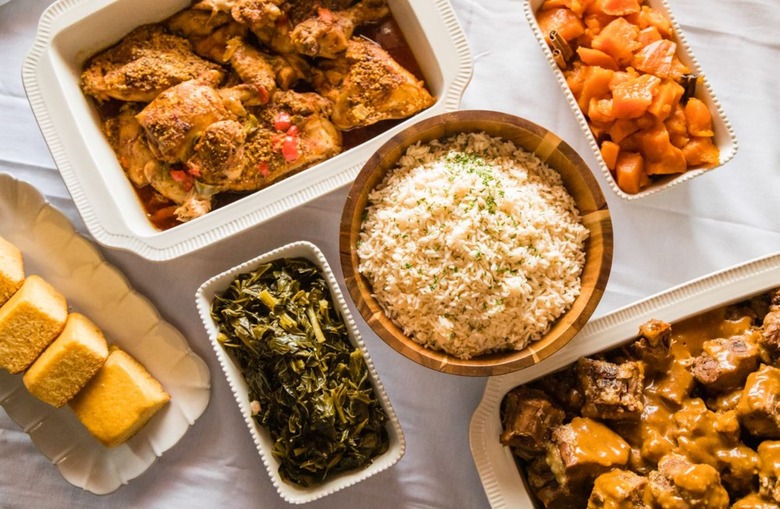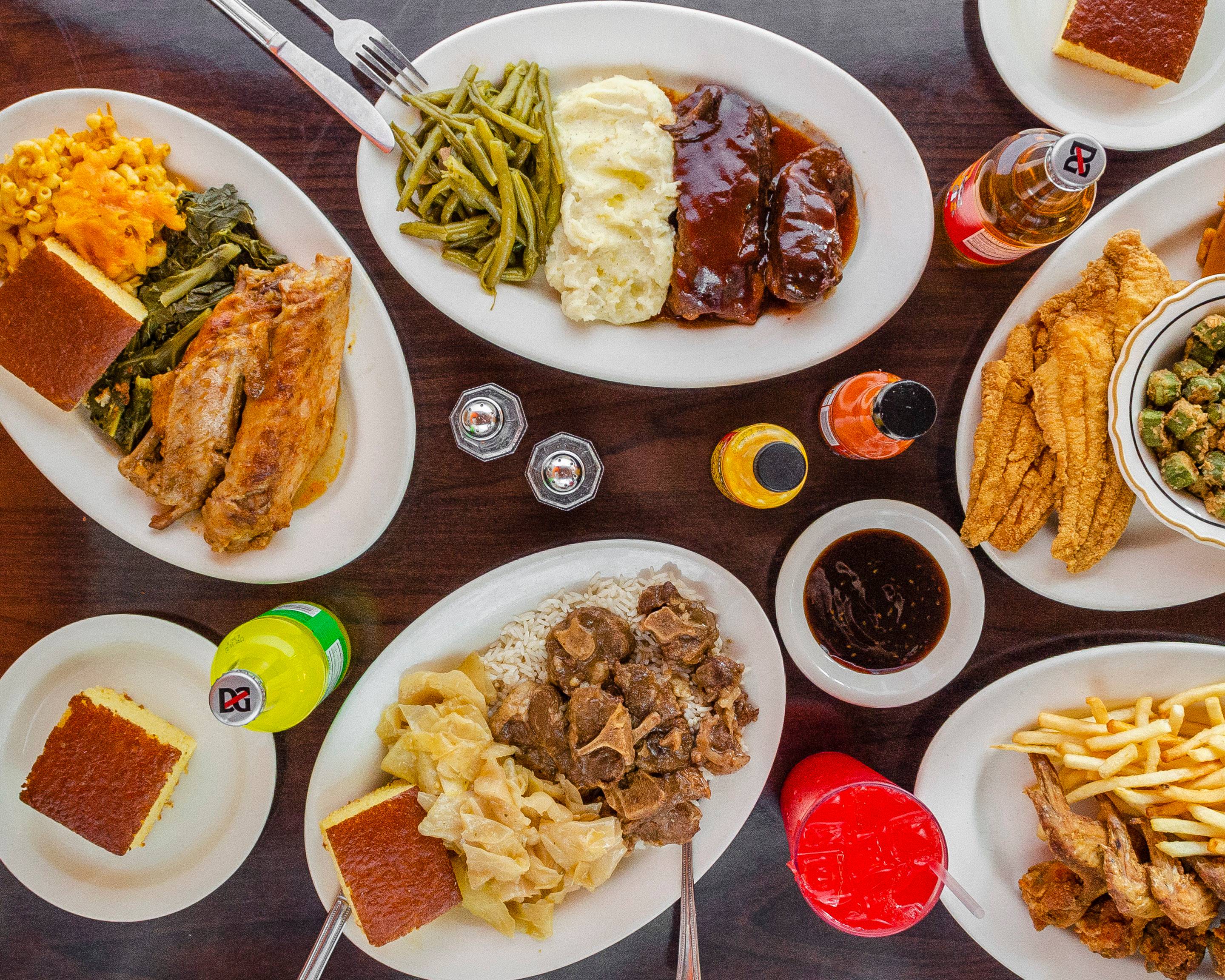Embark on a culinary journey into the heart of soul food cafes, where flavors dance and traditions intertwine. These vibrant establishments not only nourish the body but also celebrate the rich heritage and spirit of African American culture.
From their humble beginnings to their contemporary evolution, soul food cafes have played a pivotal role in preserving culinary traditions, fostering community, and contributing to local economies.
Definition and History
Soul food cafes are culinary establishments that specialize in serving traditional African American cuisine, a soulful blend of flavors and ingredients that reflects the cultural heritage and experiences of the African American community. These cafes hold immense cultural significance as they provide a gathering place for people to connect, share stories, and celebrate their shared culinary traditions.
Origins and Evolution
The origins of soul food cafes can be traced back to the post-Civil War era when freed slaves migrated from rural areas to urban centers in search of economic opportunities. As they settled in these cities, they brought with them their culinary traditions and established small eateries and cafes that served familiar dishes that reminded them of home.
Over time, these establishments evolved into the soul food cafes we know today, becoming cornerstones of African American communities and cultural identity.
Menu and Cuisine: Soul Food Cafe

Soul food cafes typically offer a menu that is rich in flavors and hearty dishes. The menu items often reflect the African American cultural heritage and traditions, with a focus on comfort food and home-style cooking.
Soul food dishes are known for their use of bold flavors and spices, often incorporating ingredients like cayenne pepper, paprika, garlic, and onion. Common cooking techniques include frying, stewing, and slow-cooking, which helps to enhance the flavors and create tender and flavorful dishes.
Signature Dishes
- Fried Chicken:A classic soul food dish, fried chicken is typically seasoned with a blend of spices and herbs, then fried until golden brown and crispy.
- Collard Greens:Cooked with smoked meats or ham hocks, collard greens are a hearty and flavorful side dish.
- Mac and Cheese:A comforting and creamy dish, soul food mac and cheese is often made with a roux-based sauce and topped with a crispy breadcrumb crust.
- Cornbread:A staple of soul food cuisine, cornbread is a sweet and savory bread that can be served as a side dish or as a base for other dishes.
Unique Flavors
Soul food dishes often incorporate unique flavors that are not commonly found in other cuisines. These flavors include:
- Smoked Meats:Smoked meats, such as ribs, brisket, and sausage, add a smoky and savory flavor to many soul food dishes.
- Hot Sauce:Hot sauce is a common condiment in soul food, adding a spicy kick to dishes.
- Buttermilk:Buttermilk is used in many soul food dishes, adding a tangy and slightly sour flavor.
Cooking Techniques
Soul food cooking techniques play a vital role in creating the unique flavors and textures of the dishes. Common techniques include:
- Frying:Frying is a common method for cooking meats, vegetables, and breads in soul food cuisine.
- Stewing:Stewing involves simmering meats and vegetables in a flavorful liquid, resulting in tender and flavorful dishes.
- Slow-Cooking:Slow-cooking is a technique that involves cooking food over a long period of time at a low temperature, resulting in tender and fall-off-the-bone meats.
Ambiance and Atmosphere
Soul food cafes exude a warm and inviting atmosphere that reflects the comforting and communal nature of the cuisine. The ambiance is typically casual and relaxed, with a focus on creating a welcoming and inclusive space for patrons.
The decor often incorporates elements of African American culture, such as vibrant colors, soulful artwork, and vintage photographs. The music playing in the background is often a mix of soul, blues, and R&B, creating a lively and upbeat atmosphere.
Service
The service in soul food cafes is typically friendly and attentive, with staff members who are knowledgeable about the menu and eager to provide recommendations. The dining experience is often characterized by a sense of community, with patrons sharing stories and laughter over their meals.
Cultural Impact
Soul food cafes play a pivotal role in preserving African American culture. They are more than just eateries; they serve as cultural hubs and community gathering places. These establishments offer a glimpse into the rich culinary heritage of the African American community, fostering a sense of belonging and continuity.
Community Gathering Places
Soul food cafes are central to the social fabric of African American communities. They provide a welcoming space where people can gather, share stories, and connect over a shared culinary experience. These cafes often host community events, such as potlucks, open mics, and storytelling sessions, further strengthening the bonds within the community.
Economic Significance
Soul food cafes have a profound economic impact on local communities, acting as cornerstones of economic development.These establishments serve as catalysts for local businesses, providing a steady stream of customers and creating a vibrant commercial atmosphere. By sourcing ingredients from local farmers and suppliers, soul food cafes support the local agricultural economy and create a mutually beneficial ecosystem.
Job Creation
Soul food cafes are significant employers in their communities, offering job opportunities to local residents. These jobs range from kitchen staff and servers to management positions, providing a stable income and career paths for individuals.
Health and Nutrition

Soul food dishes are often criticized for being unhealthy due to their high fat and calorie content. However, many soul food dishes can be made healthier by using leaner cuts of meat, reducing the amount of added fat and sugar, and incorporating more fruits and vegetables.
Tips for Incorporating Soul Food into a Healthy Diet
- Choose leaner cuts of meat, such as chicken breast, fish, or tofu.
- Reduce the amount of added fat and sugar to recipes.
- Incorporate more fruits and vegetables into soul food dishes.
- Cook soul food dishes at home so you can control the ingredients.
- Choose healthier side dishes, such as grilled vegetables, brown rice, or quinoa.
Marketing and Promotion
Soul food cafes can benefit from various marketing strategies to reach their target audience and promote soul food culture. These strategies include:
- Online presence:Creating a website and social media accounts to showcase the cafe’s menu, ambiance, and community involvement.
- Local advertising:Placing ads in local newspapers, magazines, and community websites to reach potential customers in the surrounding area.
- Community engagement:Participating in local events, festivals, and fundraisers to build relationships and raise awareness of the cafe.
- Partnerships:Collaborating with local businesses, such as caterers or event planners, to cross-promote services and reach a wider audience.
Examples of Successful Campaigns, Soul food cafe
Several successful campaigns have promoted soul food culture:
- “Soul Food Nation” campaign:A national campaign launched by the National Restaurant Association in 2005 to celebrate the history and cultural significance of soul food.
- “The Great Soul Food Cook-Off”:An annual competition held in New York City to showcase the culinary talents of soul food chefs and raise funds for scholarships.
- “Soul Food Festival”:A yearly event held in Atlanta, Georgia, featuring live music, food vendors, and cultural performances that celebrate soul food and its heritage.
These campaigns have effectively promoted soul food culture by raising awareness, celebrating its history, and showcasing the culinary skills of soul food chefs.
Design and Layout
The design and layout of a soul food cafe play a crucial role in creating a welcoming and inviting atmosphere for customers. Here’s a detailed exploration of these aspects:
Floor Plan
The floor plan of a soul food cafe should prioritize efficient flow and maximize seating capacity. Consider the following elements:
- Seating Arrangements:Design a mix of booth and table seating to accommodate groups of various sizes. Ensure ample spacing between tables for privacy and comfort.
- Kitchen Design:Plan the kitchen to optimize workflow and minimize bottlenecks. Locate the kitchen near the dining area for easy access and efficient food delivery.
- Dining Areas:Create distinct dining areas with different ambiances, such as a cozy corner for intimate meals or a larger space for group gatherings.
Website Design
A well-designed website is essential for promoting a soul food cafe and attracting customers. Consider the following elements:
- Visually Appealing:Use high-quality images of mouthwatering dishes and a color scheme that reflects the warm and inviting atmosphere of the cafe.
- User-Friendly Navigation:Make the website easy to navigate with clear menus, search functionality, and contact information prominently displayed.
- Online Ordering:Offer online ordering for convenience and efficiency, allowing customers to place orders and pay securely from their devices.
- Social Media Integration:Integrate social media platforms to connect with customers, showcase specials, and build a community around the cafe.
Clarifying Questions
What is the significance of soul food cafes in African American culture?
Soul food cafes are not just eateries; they are cultural touchstones that embody the traditions, flavors, and communal spirit of the African American community.
How do soul food cafes contribute to the local economy?
Soul food cafes often source ingredients from local businesses and employ members of the community, creating jobs and supporting the local economy.
Is soul food healthy?
While soul food dishes are often hearty and flavorful, they can be incorporated into a healthy diet by choosing leaner meats, using healthier cooking methods, and incorporating more vegetables.

